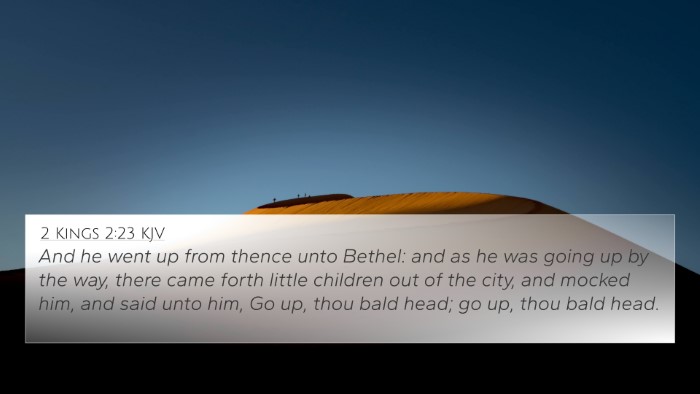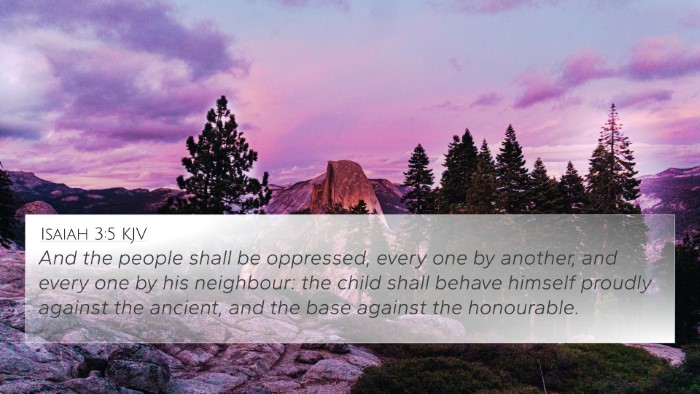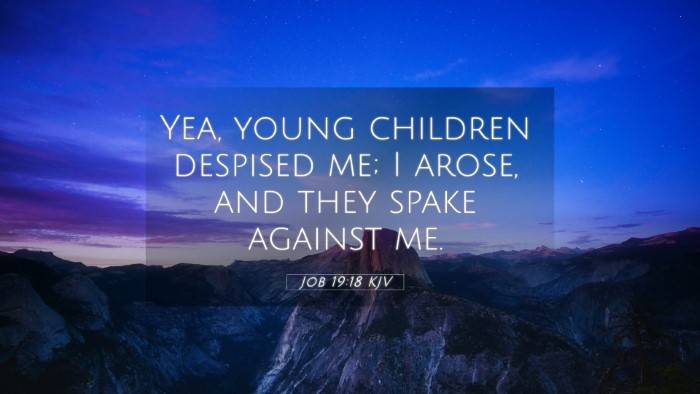Old Testament
Genesis Exodus Leviticus Numbers Deuteronomy Joshua Judges Ruth 1 Samuel 2 Samuel 1 Kings 2 Kings 1 Chronicles 2 Chronicles Ezra Nehemiah Esther Job Psalms Proverbs Ecclesiastes Song of Solomon Isaiah Jeremiah Lamentations Ezekiel Daniel Hosea Joel Amos Obadiah Jonah Micah Nahum Habakkuk Zephaniah Haggai Zechariah MalachiJob 19:18 Similar Verses
Job 19:18 Cross References
Yea, young children despised me; I arose, and they spake against me.
Uncover the Rich Themes and Topics of This Bible Verse
Listed below are the Bible themes associated with Job 19:18. We invite you to explore each theme to gain deeper insights into the Scriptures.
Job 19:18 Cross Reference Verses
This section features a detailed cross-reference designed to enrich your understanding of the Scriptures. Below, you will find carefully selected verses that echo the themes and teachings related to Job 19:18 KJV. Click on any image to explore detailed analyses of related Bible verses and uncover deeper theological insights.

2 Kings 2:23 (KJV) »
And he went up from thence unto Bethel: and as he was going up by the way, there came forth little children out of the city, and mocked him, and said unto him, Go up, thou bald head; go up, thou bald head.

Job 30:12 (KJV) »
Upon my right hand rise the youth; they push away my feet, and they raise up against me the ways of their destruction.

Job 30:1 (KJV) »
But now they that are younger than I have me in derision, whose fathers I would have disdained to have set with the dogs of my flock.

Isaiah 3:5 (KJV) »
And the people shall be oppressed, every one by another, and every one by his neighbour: the child shall behave himself proudly against the ancient, and the base against the honourable.
Job 19:18 Verse Analysis and Similar Verses
Understanding Job 19:18
Job 19:18 (KJV): "Yea, young children despised me; I arose, and they spake against me."
Summary of Job 19:18
In this verse, Job expresses profound feelings of alienation and ridicule. He points out that even the young, often viewed with innocence and respect, have come to disrespect him. This highlights Job's immense suffering and the reversal of societal norms where the elder, typically venerated, finds himself scorned by those younger than him.
Bible Verse Cross-References
- Proverbs 30:17: "The eye that mocks a father and scorns a mother will be pecked out by the ravens of the valley and eaten by the vultures."
- Psalm 22:6: "But I am a worm and not a man, scorned by mankind and despised by the people."
- 1 Peter 2:12: "Keep your conduct among the Gentiles honorable, so that when they speak against you as evildoers, they may see your good deeds and glorify God on the day of visitation."
- Isaiah 53:3: "He was despised and rejected by men; a man of sorrows, and acquainted with grief..."
- Luke 18:16: "But Jesus called them to him, saying, 'Let the children come to me, and do not hinder them, for to such belongs the kingdom of God.'
- Job 30:1: "But now they that are younger than I have me in derision, whose fathers I would have disdained to have set with the dogs of my flock."
- Psalm 39:8: "Deliver me from all my transgressions; make me not the reproach of the foolish."
- Ecclesiastes 4:13: "Better is a poor and wise child than an old and foolish king who will no more be admonished."
- Matthew 10:21: "Brother will deliver brother over to death, and the father his child, and children will rise against parents and have them put to death."
- James 4:6: "But he gives more grace. Therefore it says, 'God opposes the proud but gives grace to the humble.'
Interpretation from Public Domain Commentaries
Matthew Henry: Henry notes the dehumanization Job experiences amidst his suffering. The disdain from children, who are typically symbols of innocence and respect, adds depth to Job's despair. This emphasizes his feeling of societal rejection and isolation.
Albert Barnes: Barnes discusses Job’s statement as a reflection of the exaggerated and ironic contempt in his community. He highlights that this scorn from younger individuals serves to intensify Job's feelings of loss and abandonment by his loved ones and peers.
Adam Clarke: Clarke interprets this verse to suggest a broader theme of human folly. The idea that youth, perceived as untainted, would speak ill of an elder indicates a significant inversion of respect and suggests a cultural breakdown concerning honor and wisdom.
Thematic Bible Verse Connections
The theme illustrated in Job 19:18 resonates throughout various Biblical texts. This verse can be understood in the context of suffering, societal rejection, and the human experience of being scorned. The broader Biblical narrative often highlights the juxtaposition between suffering and faithfulness or honor.
Comparative Analysis of Related Themes
Job’s lament can be compared with New Testament instances of rejection and scorn. For instance, Jesus, as depicted in Isaiah and echoed in the accounts of His life in the Gospels, also faced ridicule from society despite His divine nature. This comparison underscores a recurring motif in the Scriptures: the righteous suffering at the hands of society, particularly from those who are perceived as innocent or young.
Tools for Cross-Referencing Bible Verses
Understanding Job 19:18 in relation to other scriptures requires effective tools for Bible cross-referencing. Utilizing a Bible concordance or a cross-reference Bible study guide can help uncover connections and deeper interpretations across texts.
Conclusion
Job 19:18 encapsulates a poignant human experience that reflects suffering, societal breakdown, and the depth of despair faced by the faithful. By cross-referencing related scriptures, readers gain a comprehensive understanding of Job's situation, ultimately allowing for a broader grasp of the Biblical themes of rejection, scorn, and perseverance in faith despite adversity.


